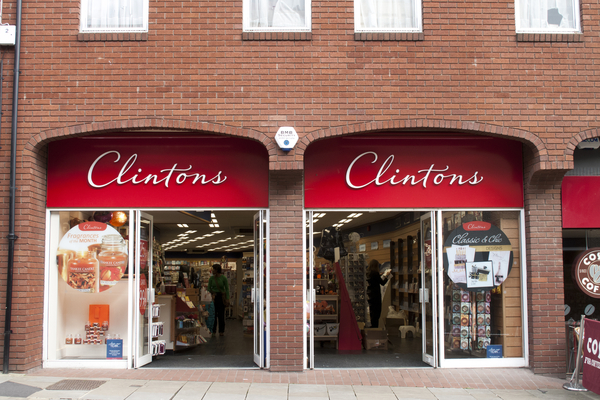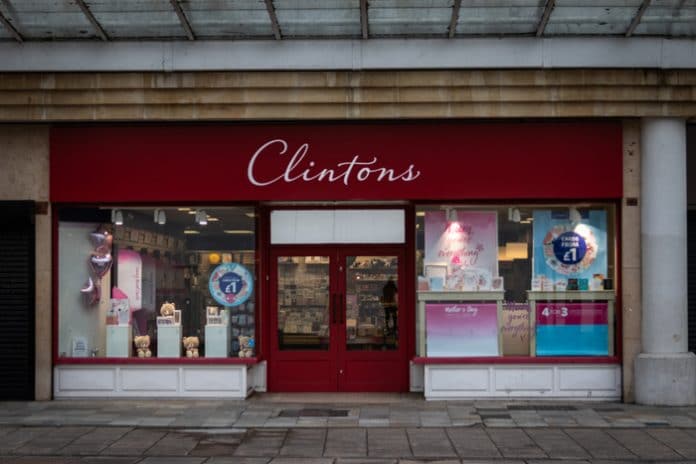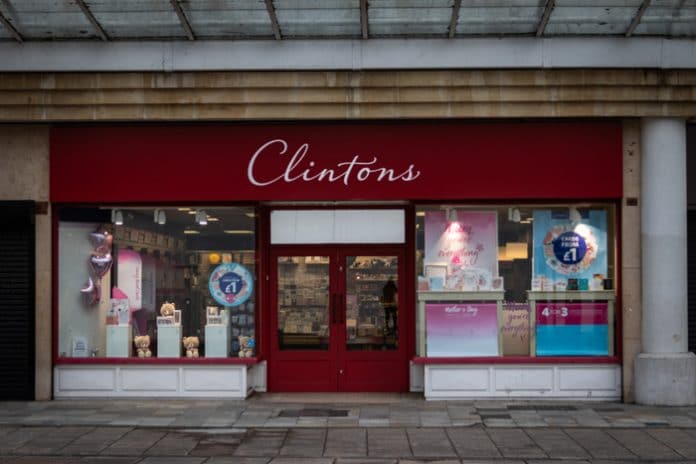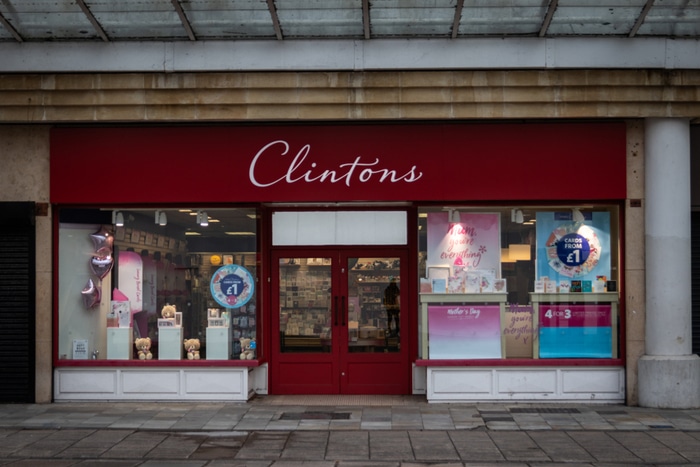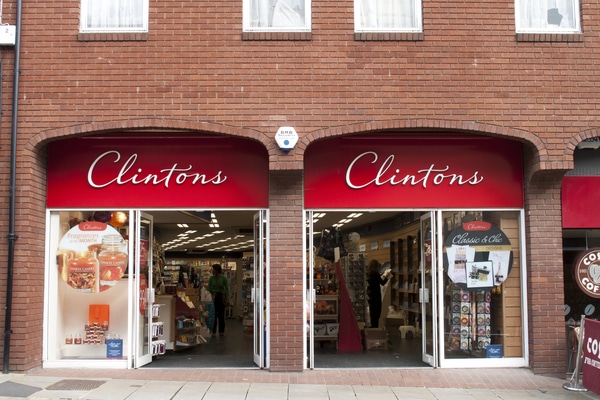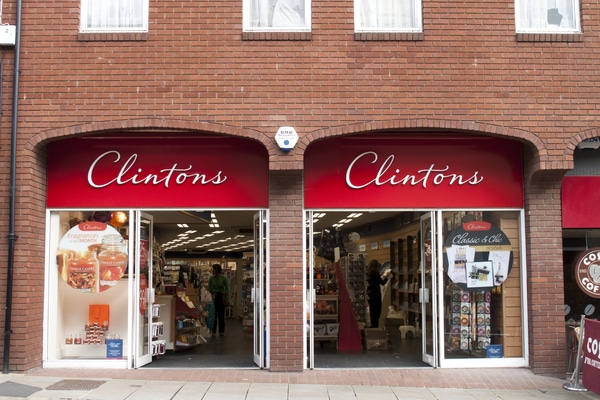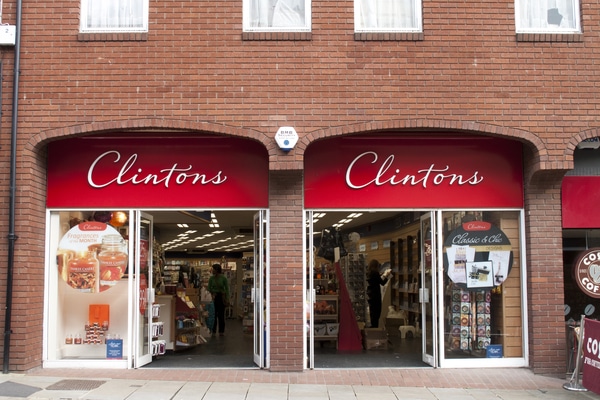Clintons’ future on the high street was secured once more after it was snapped up by family-owned greetings card specialist Cardzone in March. The once-dominant cards retailer is however a shadow of its former self, trading from a store estate 84% smaller than it once was, with just 163 Clintons branches nationwide.
At its peak, it was the clear greetings card market leader with over 1,000 stores and a presence in almost every major British town, but an influx of internet rivals alongside the growing popularity of Card Factory’s value offer resulted in the retailer losing its grip on the industry.
Clintons may be battered and bruised but the cards retailer refuses to fold, despite two administrations in the 2010s and mass store closures. However, new owner Cardzone admits it faces a challenge to get it back on track.
“We weren’t optimistic as to what we would find or the condition the business would be in, but we underestimated the task to turn it around,” admits Cardzone trading director James Taylor.

However, he and Cardzone know how to navigate the UK greetings market. He works under his dad Paul Taylor, who opened the first Cardzone in 2005. It’s a true family affair as his sister Alex looks after the marketing.
The family business has around 175 stores across the UK, the bulk of which trade as Cardzone shops, however, it also operates Hallmark, Yankee Candle, Mooch, Paper Kisses and Card Centre.
James Taylor explains the business’ growth – which reported a 28% surge in pre-tax profit to £6.48m last year against sales of £51.9m – has come mostly through acquisitions, with Cardzone acquiring the outlet business to most of its sister brands gradually over the years including Yankee Candle’s outlet business in 2020.
He says that buying Clintons seemed the next logical step.
“It was the biggest opportunity that was ever available to us over the years to really grow at a significant level and take on some really good stores,” explains Taylor, sharing that the business came close to securing a deal for the high street chain back in 2019 before the pandemic hit.
However, the family’s ties with Clintons runs a lot deeper.
Dad Paul sold his first greetings card retailer, an eight store chain The Greeting Card Group, to a venture capital-backed business before it was sold on to Clintons in the late ’90s.
“It’s quite fitting that coming up to our 20th anniversary, we’ve managed to do this acquisition of a very different Clintons, I might say, to what it was,” says Taylor.
The deal has seen the group’s store estate and turnover “effectively double”, which Taylor admits comes with a new challenges for the business.

For now, Taylor says the two brands will sit alongside each other with the pair competing in very few locations.
Along with the differing locations, Taylor says the big difference between the two chains is the size of store, with the typical Clintons shop almost double the size of Cardzone at around 2,300 sq ft.
He adds that the product mix is also distinct, with Cardzone selling more gifting than Clintons.
‘A lot to sort out’
Taylor is cautious over celebrating its new acquisition yet.
“Until we’ve got it performing, we almost don’t want to celebrate because there’s a lot of work cut out and a lot to sort,” he says. “It’s in a worse position than what we’d anticipated.”
“One thing I can say is that we’re very confident that we can turn this around, but it needs to be run quite differently to how Clintons was running the business.”
The retailer’s troubles on the high street has been widely reported. It’s aggressive growth strategy in the 1990s saw the retailer grow from around 270 stores nationwide to over 670 in the space of four years.

Then in 2004 it snapped up rival chain Birthdays – which operated 500 stores, discount business Cards Direct, and a string of Partyland franchise outlets – for £46.4m in a deal which expanded the Clintons portfolio to around 1,250.
The retailer found itself grappling with an over-inflated rent bill and increasing competition from Card Factory and the supermarkets, which forced it to call in its first set of administrators in May 2012. It was sold a few weeks later to a subsidiary of US card maker American Greetings in a rescue deal that saved 434 out of its 784 stores. Its Birthdays business was not included in the sale.
The high street chain faced collapse once more in 2019 – blaming business rates and weak consumer demand – after it failed to gain support from its landlords for a CVA. It was bought back by American Greetings in a pre-pack deal that safeguarded 2,500 jobs and 332 stores.
However, there was no return to form as Clintons hired restructuring advisers last year after racking up £5.4m in pre-tax losses as sales plunged 25% to £96.5m in the year to 27 May 2023.
Its store estate has shrunk from 232 to 160 stores nationwide as of June this year, as its previous owners sought to focus on profitable stores.
“It’s fair to say the business has struggled,” says Taylor. “Going from 1,000 stores and the processes, policies and procedures in a business of that scale, compared to one like this now – they’re very different things. I think it’s struggled as it’s downsized over the years.”
Despite that, he believes there’s still great value in the brand. “Clintons is a household name, isn’t it? People know Clintons and it’s been around for a very long time.”
Familiar with operating a greetings card business on a smaller scale, the Taylors are keen to apply their expertise to Clintons.
“Cardzone being an owner-led business, we’re very mindful and controlling of cost base,” says Taylor. “There are a lot of different products and services that Clintons over the years signed up for [such as] different facilities and financial systems.
“We’re quite simple, we keep things very basic, and that model has worked and it means that you can trade robustly on a high street that is difficult – it has its highs and lows.
“We’re an incredibly seasonal business like many retailers are, but being a greeting card specialist, without Christmas, we wouldn’t have a business it’s as simple as that.
“You have to be able to run a business all year round and you have to control your costs extremely well in the quiet times,” he says.
Taylor is anticipating a “challenging” golden quarter for Clintons as Cardzone honours the 2024 Christmas orders the high street chain placed before the acquisition.
With a difficult key trading period ahead, Taylor does not expect the high street chain to turn a profit until “post Christmas 2025 when hopefully we’ll have really traded well across that full year”.
What next?
Taylor admits that the family hasn’t fully decided on the finer details of its plan for Clintons, sharing that most of his time has been spent on trying to get the high street chain back on track.
“We don’t actually know exactly what direction we’re going to take some of these things in,” he admits.
“It’s hard to say because we’ve got so much to sort out within the business and that change is going on right now. At the moment, you’ve got two sets of everything and that model won’t work long term so we are making some changes in that way.”
He says that is “going to mean some pain this year” with its brand strategy and growth plan coming into force from 2025 onwards.
That pain may include some more Clintons store closures in the coming months, on top of the existing foreclosures of branches that were not included in the sale, “whilst we get the ship turned around”.
“The problem is that some of the Clinton stores are way too big for modern times on the high street so it’s downsizing and finding something more suitable.”
However, Taylor is cautious of how discussions with landlords will go “because of how the business was run previously”.
Rightsizing the store portfolio is only half of the problem.
“The Clintons stores aren’t the most easily shoppable and they can be quite claustrophobic,” says Taylor.
“We want to try and open things up a bit, showcase the high proportion of cards as we know that most customers come in for that. Then from a gift in perspective, we use quite low circular tables in Cardzone and that works effectively.”
“We see the most opportunity to grow sales on the gifting,” says Taylor, explaining that the business has introduced more giftable products to widen its appeal to shoppers.
Clintons has been seen as a more premium card shop on the high street when compared with Card Factory and Cardzone itself, but Taylor admits it will introduce more offers in store to align with Cardzone, which is “quite promotional driven because customers like a bargain”.
Clintons 3.0

Once Clintons is profitable again, Taylor says the team can begin to look at “the exciting stuff” such as launching “the future look of Clintons”.
“We want to have a concept that definitely holds on to the traditional key factors of Clintons but also introduces some newness and giftware and different ways of displaying products.”
He predicts this will likely start rolling out “either later this year or 2025”.
This will be the second brand refresh for Clintons, as its previous owner ditched the chain’s well-known orange branding in favour of its current red logo back in 2012 after it bought the brand out of administration – although Taylor hinted that it will stick with red.
He is also considering rebranding some of the existing Cardzone stores as Clintons once the rebrand is complete “because we know that the Clintons name does hold a lot of value”.
Part of the “big brand refresh” will also include opening more shops “because that’s what the high street needs”, he says.
Both him and his sister Alex are passionate about the role of card shops on the high street.
“People will go to supermarkets [for their cards] because they’re convenient, but if you’re on a high street, people will make that journey to go visit their favourite brands and see what’s new,” she says.
“The UK population loves buying and sending cards and people are living longer,” he adds. “There’s a larger elderly population out there, and they are predominantly our typical customer -, middle aged, female.”
Taylor suggests that previous owners have made “mistakes trying to revolutionise the brand” in launching new products and add-ons to reach a new consumer, all while forgetting about its core customers – the middle-aged female.
Keeping in line with its self-proclaimed simpler operations, his sister Alex says it is unlikely that Clintons will relaunch its online shop anytime soon.
“We’ve got enough on our plate looking at the physical stores but it could be something that we’re looking to in the future. We just need to get all of the physical stores into a really good place [first],” she says.
“The growth in online in my opinion, and from looking at Moonpig and Funky Pigeon, is all around personalisation. That would be a completely new remit for us because we’re very much traditional cards.”
It’s a model that has served well for the rest of the Cardzone business, which has focused on building a reputation within the local community instead of on national scale. Perhaps a dose of family values could be just what Clintons needs to get back on its feet.
Click here to sign up to Retail Gazette‘s free daily email newsletter




